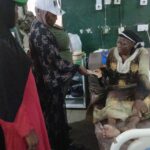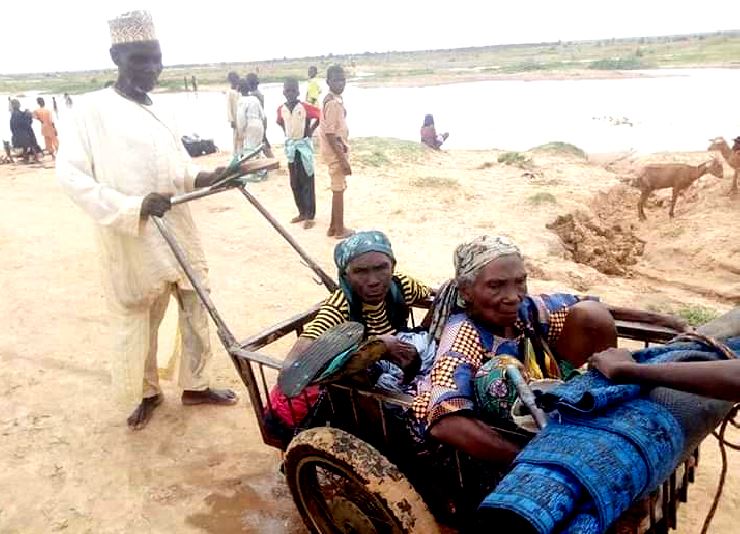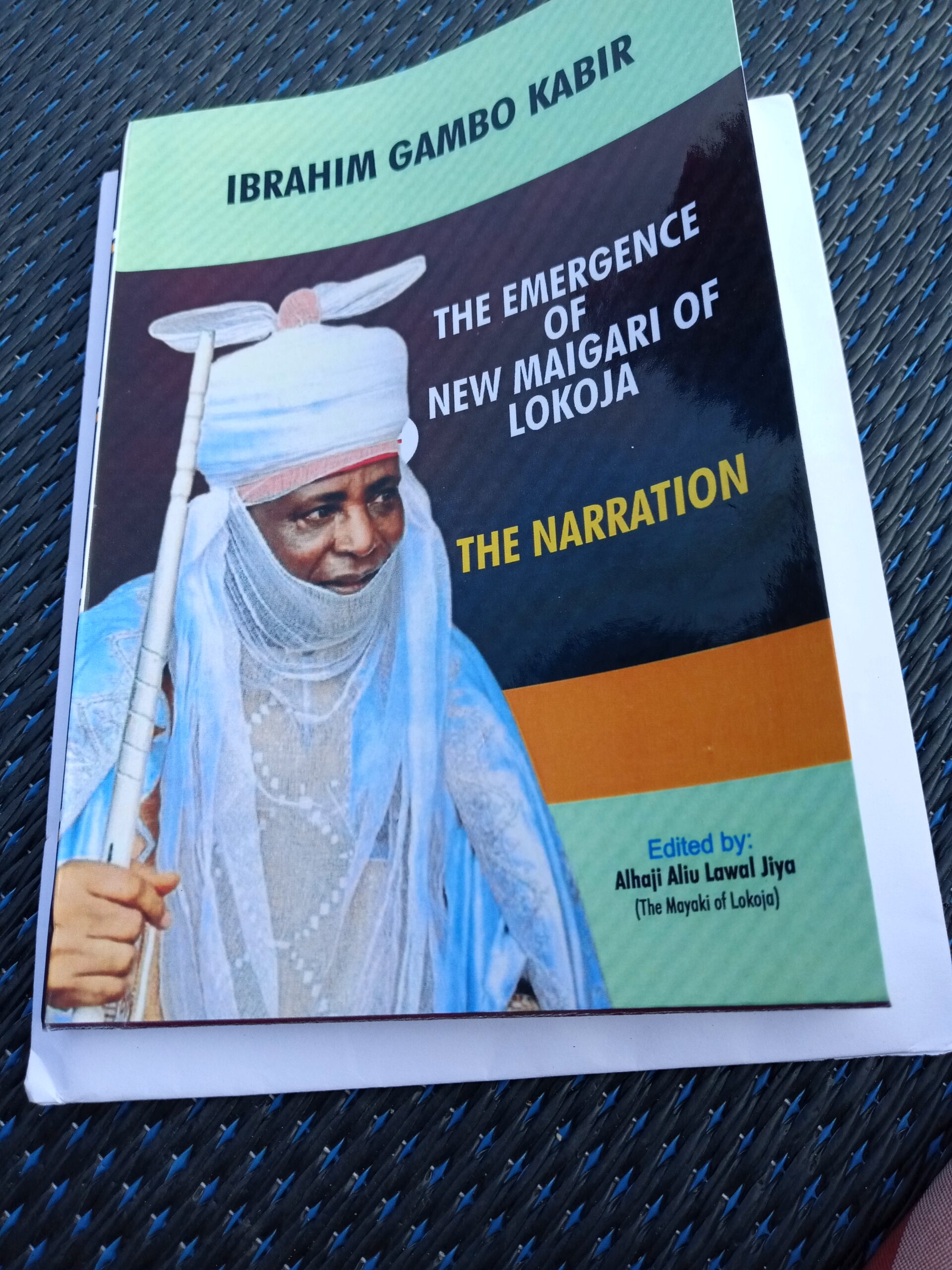
Gruesome lives of families torn apart by banditry in Zamfara
• A victim of bandit attack being taken for burial
Men share their wives with bandits, orphans litter the state as terror escalates
Rekiya Dingi has no happy place. Her childhood home is a coffin for her loved ones. A casket of love through which anguish had raged. Her surviving relatives want nothing to do with her. Those who dared look her way, scorned her ordeal even as they talked eyes to her grief.
“They blame me for father and Baba (her grandfather)’s death,” the 16-year-old said, recalling the tragic evening, when bandits invaded her home in Dansadau, Zamfara State, and split open her father’s skull.
“They accused me of giving up some of their informants to the military. But father owned up to it to protect me. They killed him. They killed Baba (Grandpa Dingi) too,” she said.
ADVERTISEMENT
Through her recall, Rekiya’s mind unfurled like a maze of harrowing realities; sorrow nebulously flowered from its fragile precincts as she relived the carnage that turned her and over 200, 000 people to refugees in the last decade.
Armed banditry plaguing Zamfara and neighbouring northwestern states, Katsina and Sokoto has consumed more than 8,000 lives – mainly in Zamfara – with over 60,000 fleeing into Niger Republic in the last decade, according to the International Crisis Group (ICG).
Through the mayhem, livestock and crops have been decimated, further depressing human livelihood indices that were already the country’s lowest.
Despite its economic potential, the North West has the highest poverty rate in Nigeria. As of 2019, all seven states in the zone had poverty levels above the national average of 40.1 per cent, led by Sokoto (87.7 per cent), Jigawa (87 per cent) and Zamfara (74 per cent).
Amid the mayhem, Rekiya recalled her life in time of peace. “Baba (Grandpa Aminu) played the flute. He sang to me and my siblings. He gave us money and bought us fine clothes for Sallah festival. He was a good man,” said the 16-year-old, evidently swooning.
But just before she got lost in the happiness of remembering, she remembered her last moment in her father’s house. After Subh, the predawn prayer, she huddled with her siblings over a large bowl of untreated millet. They had soaked it with 10 percent of water overnight to soften it. It was Rekiya’s job to pound it and separate the good grain from the hull – the bran or fibrous outer layers of the grain.
• A victim of bandit attack being taken for burial
As she settled to her task, the bandits struck, shooting sporadically in the air. They kicked down their front door, asking for Rekiya. Promptly, her father, Saliu, stepped to her defence. “He said he spoke to the soldiers. Not me,” Rekiya recalled. The bandits hit him repeatedly with their guns and forced him to his knees. They read out his crimes to him and shot him in the head at close range, splitting his skull. Grandpa Aminu, 82, the deceased’s father-in-law, cursed the attackers in fury, and for that he was shot in the neck and stomach. He died instantly.
But the bandits weren’t done. They abducted Rekiya and her two sisters, leaving their pregnant mother behind. “They left her because her pregnancy was already at full term. One of the bandits said she was useless to them. When she struggled to stop them from taking us, they kicked her in the belly repeatedly, about five times, and once with the butt of a big gun. Then she started bleeding,” said Rekiya, lamenting that she later found out that the bandits left her mother dead, in a pool of amniotic blood.
Subsequently, the teenager got separated from her sisters: Amina, 10, and Hafsatu, seven, in the forest. “I learnt that they were taken to separate camps in Sokoto and Niger State. They(the bandits) felt we were too close and protective of each other,” she said.
Luck, however, smiled at Rekiya in the wake of a military offensive against bandits prowling the Sububu forest region, stretching from Zamfara to Sokoto State. “I saw an opportunity to escape and I took it,” she said, “The soldiers rescued me and gave me bread and water.”
But since her return, her surviving relatives and neighbours have avoided her. “They said they heard rumours that I was happily married to one of the bandit leaders. That was a lie. I simply pretended to be his wife, to avoid being gang-raped by other bandits. Still, everybody treats me like a bandit’s wife. My aunt and late mother’s sister, Hassanatu, chased me away when I saw her in Gusau. She said I caused everybody’s death and no relative wants to be seen with me,” said Rekiya.
Processing millet was less complicated, Rekiya would admit. Back in her father’s house, she dreaded the chill of the cold water used to soften the grains before pounding it. Yet it was markedly easier to steel her body for the chill and splash of the pungent millet water than to live with a bandit as his captive wife. Dealing with unforgiving relatives and suspecting neighbours afterwards induces a different kind of chill. Nothing prepared her for it. It changed a whole lot of things about her. It changed her.
Seeking alms to survive
Abandoned by her relatives, Rekiya loiters around Maru, in the company of fellow internally displaced persons (IDPs). “I cannot go home. The bandits have taken over everywhere,” she said.
To survive, she goes out to beg for alms everyday. “Sometimes, people give us food and sometimes, they give us money. But it is never enough,” said the 16-year-old. The highest she had ever made from alms-seeking was N100, she said, adding that she makes between N30 and N50 everyday.
Like Rekiya, Saratu’s memories of home are fettered by misery. Life has been excruciating for her since she fled her village in the wake of a bandit attack.
Everyday, she must go out and beg for food or money to feed herself and her eight siblings.
As she narrated her ordeal, the 18-year-old navigated the numbing crevices of grief, like a vagrant travelling barefooted on hot coal fields. Her eyes bore tiredly from their sockets and the weight of her sorrow knelled a mournful dirge even before her story was fully told. Visibly distraught, Saratu lamented a life full of hardships.
“Just the other day, I entered a house in Tsafe, to beg for food from a woman but she started acting suspiciously. She told me to enter her room and bring something for her. Seeing that I was reluctant, she entered before me and kept urging me to come in with her. She had already closed the main entrance of the house but I declined her invitation. I opened the door and fled from her house. Subsequently, I was invited by a man inside his room to collect money but I refused,” she said, adding that despite their suspicious sexual advances, the highest each culprit was ready to give her was a measly N50.
“Life became so hard since we fled our home. I have eight younger brothers and sisters. We eat very little food. Sometimes, we sleep hungry,” said Saratu.
Widows of Kadamutsa
There is no gainsaying insecurity exerts more grievous toll on the elderly. For instance, Gadon Maidamma, 71, lived peacefully in Kadamutsa in Zurmi, Zamfara, until armed bandits sacked her from her home. She said, “Life in Kadamutsa became a living hell. The bandits came to loot and kill. They killed my husband, my son and four of my grandchildren,” she said, pointing out that the lady bathing a child nearby was her late son’s widow.

• Several women and children, rid of their men are forced to live on the fringes as IDPs
“One of my younger neighbours whose husband was killed was nursing a seven-month old baby, another widow was left with five children when her husband was killed. We are all left to our own devices. Look at me, I am already too old to fend for myself. We need food. We also have to feed all the orphans left behind. Many of them have to go out and beg for food everyday,” she said.
Just say: “Yes sir!”
While the impact of the violence on children, women and the elderly accentuates in real time, the consequences for the northwest male are equally grisly.
”It’s excruciating. Many young boys and men suddenly find themselves on the receiving end. They have become the disposable elements at the bottom of the totem pole,” said Balkis Ahmed, a Gusau-based trauma psychologist and social worker.
Read Also: Atiku laments banditry, insists on restructuring
In truth, several males in the region hitherto ensconced in cozy positions of providers and family heads are hauled on to the fringes of existence in Zamfara’s re-calibrated life-cycle.
“It’s a bad time to be a man. If we cannot join the bandits or work for them as informants, we must run away or end up losing our lives,” said Aliyu Madachi, a displaced farmer and former resident of Shinkafa.
Corroborating him, a staff of the Zamfara State Emergency Management Services (SEMA), stated that the only rational option for most men is to flee with their families.
“Those who are too old or weak to flee are forced to live as captives in their own homes,” she said.
The Nation findings revealed that several villages and local councils are currently under siege by armed bandits. Residents of Dumburum in Zurmi, Badarawa in Shinkafi, Kizara in Tsafe and Dangulbi in Maru Local government areas, for instance, live under the persistent fear of attack and yoke of subjugation of notorious bandit leaders and their lieutenants.
“We know them. Many of them grew up here. But no one dares challenge them. The child whose nose you cleaned yesterday has grown into a bandit. When he comes to your home to rob you of your food and money, just give it all to him. Don’t challenge him. Just say, ‘Yes sir!’ Don’t give him the evil eye, if you do, might end up losing your life. He would gun you down. If he lays hand on your daughter or wife. Just say, ‘Yes sir!.’ Pray that he finishes quickly and never come back. Pray that he doesn’t take (abduct) them away. Whatever happens, stay alive. Be grateful,” said Mohammed Maru, a resident of Dansadau.
Men cuckolded by bandits
But gratitude would never cut it for Murtala Kanwuri. Bankrupt and displaced from his home in Gidan Baru, the 68-year-old cut the picture of a haunted man. Kanwuri is distraught. His youngest wife, Usama, “is sleeping with his former herder,” Bilyaminu, an orphan he raised from childhood.
Bilyaminu, 17, was entrusted in his care soon after his parents died in a road accident en route Bauchi. But the teenager has grown from a mild beneficiary pecking on superfluous affection into Kanwuri’s nemesis. “He joined bandits and stole from me. He is a cursed child,” said the 68-year-old.
A dark drawl of omen rattled in his words, leaving a heft of anguish in the laden air. The resonance was unsettling. Sad, bitter words leapt from his lips and clung to the air with a nostalgic peal. Kanwuri’s story boomed with heartbreak and resentment.
Through his narrative, Usama, his 18-year-old wife and caregiver, plucked blooms and young leaves from a herbal plant for sale at the local market. As she worked, she sang sonorously in her native dialect. The song, when translated, glorified the exploits of a legendary bandit, who stole from the rich to feed the poor.
Kanwuri cursed under his breath, uttering an oath like an eerie groan. His blunted words threatened mishap for the singer and every armed bandit.
Aliyu, my translator, explained afterwards that Kanwuri believed that his wife sang to taunt him.
Two days later, the 68-year-old recounted how marauding bandits abducted his two wives, right from under his roof. He dreaded their molestation of his youngest wife, Usama, in particular, because they were barely three months into their marriage. Kanwuri remembered them grabbing her and copping a feel of her supple body.
One of the bandits smacked Usama’s butts, saying her youth and beauty was wasted on an old man. Livid, Kanwuri shoved the molester and that earned him a severe beating. His 13-year-old son, Umar, sprang to his defence and in the consequent scramble, got stabbed and shot in the head.
The bandits made away with Kanwuri’s two wives. And even though the ransom he paid for their freedom bankrupted him, his first wife, Awa, packed her belongings and absconded from home, four days after her rescue. Usama, his youngest wife, however, stayed behind more out of pity than love, it would seem.
“Awa ran away to be with her forest husband (bandit). But me (sic) I stayed behind. He (Kanwuri) should show gratitude. No woman will marry him. He is too old, very weak and penniless,” said Usama.
Nonetheless Kanwuri accuses her of unfaithfulness. He said, “Usama has become wayward with bandits. She is committing an abomination.” Initially, Kanwuri was acceptive of his situation, thinking his wife was the concubine of Dogo Gide, a notorious bandit terrorising Dansadau.
But he eventually discovered, through a neighbour’s mother-in-law, who got kidnapped and ransomed, that his wife wasn’t having an affair with Dogo Gide but with his herder turned bandit, Bilyaminu. Ever since, Kanwuri has been plotting payback.
But at his age, there is little he could do. He has barely recovered from a stroke, which he suffered in June 2020, and he lacks the resources and influence to exact retribution.
Findings revealed that Bilyaminu relocated to the forest since November 2020. He is one of the strongest members of a gang allegedly loyal to Dogo Gide.
There is no gainsaying several men like Kanwuri abide in Zamfara’s troubled crannies. Occasionally, their wives leave home, sometimes in a group, under the pretext of petty trading or begging for alms. Oftentimes, they return with food and money.
“Sometimes, they go overnight. What manner of trade or alms-seeking lasts from morning till dawn of the next day? It’s a terrible thing to happen to any man,” said Maru-based Lukman Mala, 89.
Eventually, some husbands learn to turn a deaf ear and a blind eye, bidding dawn to intrude apace and rid them of the tyrant imagery of their wives, whose ripped moans split their subconscious through the night.
Tsafe-based sweets hawker, Habibatu Mafara, stated that, “Some women do it for food and some do it for money.” And some wives cuckold their husbands as a gesture of personal sacrifice, she said.
Further investigations revealed that, some husbands, on discovery that they had been marked for death by bandits, who accuse them of giving up their informants to the military, become jittery. When this happens, the accused man either flees with his family or takes the initiative to approach the bandits, through a proxy, to plead for leniency.
In doing this, he must be ready to abide by the bandits’ terms: which could be a cash penalty or fine, or giving up his wife or wives for several nights in the bandits’ leader’s bed. Sometimes, the bandits visit the home of their victim and lay with his wives in his presence.
“They do this when they truly intend to humiliate the husband. Even so, they kill the man afterwards,” said Junaidu Lawali, from Shiya Galadima. Lawali admitted, however, that there had been instances whereby the wives seized the initiative to approach the bandits on their husbands’ behalf.
“Sometimes, a wayward wife could also collude with her lover among the bandits to force her husband to give her up as a comfort wife or concubine to her bandit beau. These things happen. Those bandits have ruined everything. They have destroyed too many families,” said Lawali.
Several men have been known to resign to wretchedness, bearing their grief like a secret shame. For instance, Kanwuri, during his chat with The Nation, did a great job hiding his misery until his eyes parted and peeled from the burden, spilling the rivulet of a prodigal tear.
Yet several men cling tenaciously to beloved visions of their wives. Whatsoever the circumstances, they appreciate their wives as life-savers, unwilling participants in a vulgar rite of atonement. To those whose wives do it for food, they are husbands to virtuous women parting their limbs for a meal in silent fury. The assumption of their wives’ discomfort, however, is a necessary performance of will – as the circumstances often vary.
Three cups of rice for three rounds of sex. A quart of cooking oil for three long nights in the fetid saddle of a menacing bandit often seems gross but acceptable. Sometimes, the bandit delegates the romp to a zealous underling. Especially when his bed is full with reputable villagers’ wives.
The husbands learn to keep a stiff upper lip. No sacrifice is too much as long it keeps them safe or their bellies full. Men silence their pride to stay alive. Women barter their honour to survive. It’s flipsides of the same coin.
Just recently, a young man was reportedly hacked to death by bandits in Gwashi, Bukkuyum LGA, while trying to prevent them from raping his wife on their wedding night.
Yusuf Anka, shared photos from the funeral of the young man on Twitter, writing: “The remains of a newly-wedded young man being laid to rest in Gwashi…He was killed by bandits while protecting his newly-wedded wife from being raped by the bandits on her first day in her matrimonial home.”
‘Government can’t help us’
Despite the precarious situation, the government has failed to allay the citizenry’s fears. “Government can’t help us. They are also afraid of bandits. Many elected representatives avoid their constituencies. They only come to bury victims of banditry and make empty promises,” said Usman Kana, a displaced farmer.
Just recently, a bandit leader, Halilu Kachalla, was reportedly consulted to assist in securing the release of the father, step mother and five other relatives, of Nasiru Magarya, Speaker of Zamfara’s House of Assembly, soon after bandits abducted them from their village in Magarya, Zurmi local government area (LGA). The bandits demanded a N500 million ransom for their release.
Zamfara’s police spokesperson, Mohammed Shehu, confirmed the incident even as aides to the Speaker called it a deliberate plan to extort money from the speaker.
Many families have learned to quietly pay requested ransoms or whatever they could afford, to the bandits. Villagers, speaking under a cloak of fear, revealed that they know some of the bandits and their kingpins. Even the government has been seen to coddle and patronise them, they claimed, condemning Governor Abubakar Matawalle’s two-cows-for-a-bandit’s-gun approach as a failed venture. Matawalle devised a scheme to manage the crisis by offering repentant bandits in Zamfara two cows for every AK-47 rifle surrendered to his government.
An average cow in northern Nigeria costs about N100,000 ($192; £141) while an AK-47 on the black market could cost as much as N500,000 ($962; £706).
Despite such measures, armed banditry subsists as a burgeoning enterprise in Zamfara and neighbouring northwest states. As the malady persists, several rural families have been uprooted from their homes and farmlands. Those who stay behind are forced to comply with the bandits’ extreme demands. For instance, many farmers submitted to work as farmhands for bandits in Kawaye and Dansadau, soon after the bandits wrote them, warning them to stay away from their farms or face dire consequences – unless the farmers agreed to work on the bandits’ farmlands first.
A humanitarian time-bomb
“The situation in the region is a cause for concern, particularly in view of the rise of criminal groups operating in Nigeria. This is the whole point of UNHCR’s presence in the region,” said Alessandra Morelli, UNHCR Representative in Niger.
• Residents of Tsafe block the road linking Katsina, Kano and Kaduna in protest against bandit attacks
The crisis has also triggered a humanitarian challenge. Hundreds of thousands of people have been displaced. In September 2019, a joint assessment mission by the UN High Commissioner for Refugees (UNHCR) and the National Commission for Refugees, Migrants and Internally Displaced Persons, citing local government authorities’ estimates, reported 210,354 persons displaced from 171 towns and villages in the northwest.
At the moment, Zamfara has 34,000 heads of households living as Internally Displaced Persons (IDPs), according to Fa’ika Ahmad, the state’s Commissioner for Humanitarian Affairs, Disaster Management and Social Development.
Declaring open a four-day workshop for review of the state’s Social Protection Policy (SPP) implementation framework, Ahmad said there are about 180,000 women and children who are IDPs in the state. She blamed the large figures on worsening insecurity in the state, adding that available data showed that the state was in urgent need of humanitarian and social support.
There is only loss
Insecurity has sowed seeds of fear, uncertainty, and despair among Zamfara communities. Families are scattered, and children are left without care. Family heads, mostly men and boys, get killed by armed bandits while their wives and daughters get raped and abducted for ransom.
The impact on children is usually very severe. Abubakar, five, suddenly lost his capacity to talk in the wake of an attack on his family home. Yana, his sister and only surviving guardian, revealed that he was in their father’s arms, eating, when bandits shot the latter to death. “Abubakar stopped talking after the incident and he cries a lot especially in his sleep,” Yana said.
It could take between three months to one year for such a child to recover his speech, according to Farida Iliya, a clinical child psychologist.
Mohammed said her visits to several IDP camps have revealed children in various states of trauma needing urgent mental health support. “Many of them (children) resume bed-wetting. I have seen adolescents wet their bed too. Many experience night terrors and so on. They need urgent post traumatic healthcare. But the resources just aren’t there,” she said.
Children living in conflict zones are increasingly vulnerable at school and in their hospital beds, both of which should be protected safe spaces.
Arif Daji, a sociologist, argued that the situation in Zamfara is particularly worrisome due to the absence of stable family structures. “Insecurity takes its toll on everything, especially the family. The family unit has been completely destroyed. As it falls apart, everything else falls apart: school, religion, local government, community. Family is the thread holding them all together. When it is severed, life, everything ends as we know it. There is no community without family.”
Daji might have a hard time convincing victims of banditry and slaughtered families, like Rekiya. The 16-year-old, following her rescue from her abductors and rapists, returned to a hostile environment. She does not know her underage sisters’ whereabouts and her relatives want nothing to do with her. Rekiya battles trauma and social stigma.
Expert psychologists have urged the government and other humanitarian actors to enhance service provision to female survivors of conflict-related sexual violence. But they should also ensure that more survivor-centred services are extended to affected boys and men. The support efforts should also integrate social workers into health clinics, communities and IDP camps where families are identified at risk of breakdown. Social workers should ensure that follow-up home visits are conducted together with religious officials to provide guidance to husbands and family members and that family mediation is carried out, according to Dr. Abubakar Monguno, whose team authored a report on remedial trauma support to victims of conflict-related sexual violence.
But that is in the long run. In the short run, urgent steps must be taken to assist victims like Rekiya, Saratu, Abubakar, Kanwuri and Maidamma to pick up the broken pieces of their lives. To many, their struggles blend into the hobbling steps of the northwest’s brutal re-awakening. Their collective fate, however, resonates a tragedy so overpowering that it becomes a torrent of feelings.
Beyond that there is guilt – that our desire for them is so strong that it sets the society, like a bird of prey, to stalk them, stigmatise them and reignite their buried narratives. In their sad, sorry world, every muted anguish or poignant recall pricks their minds and sinks like claws. There is no closure. There is only loss
Olatunji OLOLADE,is the Associate Editor of THE NATION NEWSPAPER












